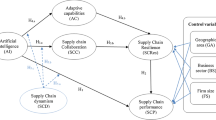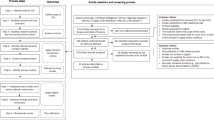Abstract
In light of the information revolution, this study aims to clarify the impact of artificial intelligence and supply chain resilience on the supply chain performance of engineering, electrical, and information technology companies registered with the Jordan Chamber of Industry. This study expands knowledge by exploring the relationships between artificial intelligence and the moderating supply chain dynamism. This study looks at artificial intelligence as an important resource, in addition to resilience supply chains, an important resource in raising the supply chain performance for companies. The questionnaire was conducted via e-mail and the study sample included (208) companies registered with the Jordanian Chamber of Industry and Commerce. The data was analyzed using the smart (Pls) software and its direct link with artificial intelligence and supply chain resilience. In addition, the analysis shows that there is a direct relationship between the mediating variables supply chain dynamism and supply chain resilience and supply chain performance. These results provide an insight into the relationship between artificial intelligence and supply chains, and the Moderating variable on the performance of a company's supply chains, which may be an entry point for companies to enhance their performance due to the importance of this sector to the Jordanian economy.
Access this chapter
Tax calculation will be finalised at checkout
Purchases are for personal use only
Similar content being viewed by others
References
Belhadi A, Mani V, Kamble SS, Khan SAR, Verma S (2021) Artificial intelligence-driven innovation for enhancing supply chain resilience and performance under the effect of supply chain dynamism: an empirical investigation. Ann Oper Res 2021:1–26
Gartner (2022) No title. https://www.gartner.com/en/documents/3897266/2019-cio-survey-cios-have-awoken-to-the-importance-of-ai
Dubey R, Gunasekaran A, Childe SJ et al (2020) Big data analytics and artificial intelligence pathway to operational performance under the effects of entrepreneurial orientation and environmental dynamism: a study of manufacturing organisations. Int J Prod Econ 226:107599
Choi T, Wallace SW, Wang Y (2018) Big data analytics in operations management. Prod Oper Manag 27(10):1868–1883
Grover P, Kar AK, Dwivedi YK (2020) Understanding artificial intelligence adoption in operations management: insights from the review of academic literature and social media discussions. Ann Oper Res 308:177–213
Ivanov, D, Dolgui A, Das A, Sokolov B (2019) Handbook of ripple effects in the supply chain, vol 276, Springer
Dubey R et al (2020) Big data analytics and artificial intelligence pathway to operational performance under the effects of entrepreneurial orientation and environmental dynamism: a study of manufacturing organisations. Int J Prod Econ 226:107599
Belhadi A, Zkik K, Cherrafi A, Yusof SM, El fezazi S (2019) Understanding Big Data analytics for manufacturing processes: insights from literature review and multiple case studies. Comput Ind Eng 137:106099
Belhadi A, Kamble S, Fosso Wamba S, Queiroz MM (2022) Building supply-chain resilience: an artificial intelligence-based technique and decision-making framework. Int J Prod Res 60(14):4487–4507
Queiroz MM, Ivanov D, Dolgui A, Fosso Wamba S (2020) Impacts of epidemic outbreaks on supply chains: mapping a research agenda amid the COVID-19 pandemic through a structured literature review. Ann Oper Res 2022:1–38
Jordan Chamber of Industry (2022) No title. https://www.jci.org.jo/Chamber/Sector/80066/-The_engineering_electrical_andinfor-mationtechnology_industries?l=en
Wollschlaeger M, Sauter T, Jasperneite J (2017) The future of industrial communication: automation networks in the era of the internet of things and industry 4.0. IEEE Ind Electron Mag 11(1):17–27
Guzman AL, Lewis SC (2020) Artificial intelligence and communication: a human–machine communication research agenda. New Media Soc 22(1):70–86
Schniederjans DG, Curado C, Khalajhedayati M (2020) Supply chain digitisation trends: an integration of knowledge management. Int J Prod Econ 220:107439
Huin S-F, Luong LHS, Abhary K (2003) Knowledge-based tool for planning of enterprise resources in ASEAN SMEs. Robot Comput Integr Manuf 19(5):409–414
Toorajipour R, Sohrabpour V, Nazarpour A, Oghazi P, Fischl M (2021) Artificial intelligence in supply chain management: a systematic literature review. J Bus Res 122:502–517
Treleaven P, Batrinca B (2017) Algorithmic regulation: automating financial compliance monitoring and regulation using AI and blockchain. J Financ Transform 45:14–21
Huang M-H, Rust RT (2021) A strategic framework for artificial intelligence in marketing. J Acad Mark Sci 49(1):30–50
Dubey R, Altay N, Gunasekaran A, Blome C, Papadopoulos T, Childe SJ (2018) Supply chain agility, adaptability and alignment: empirical evidence from the Indian auto components industry. Int J Oper Prod Manag 38(1):129–148
Jeble S, Kumari S, Venkatesh VG, Singh M (2020) Influence of big data and predictive analytics and social capital on performance of humanitarian supply chain: Developing framework and future research directions. Benchmarking 27(2):606–633
Kano L, Oh CH (2020) Global value chains in the post-COVID world: governance for reliability. J Manag Stud 57(8):1773–1777
Sundarakani B, Pereira V, Ishizaka A (2021) Robust facility location decisions for resilient sustainable supply chain performance in the face of disruptions. Int J Logis Manag 32(2):357–385
Adobor H (2020) Supply chain resilience: an adaptive cycle approach. Int J Logis Manag 31(3):443–463
Chowdhury MMH, Quaddus M, Agarwal R (2019) Supply chain resilience for performance: role of relational practices and network complexities. Supply Chain Manag 24(5):659–676
Tarafdar M, Qrunfleh S (2017) Agile supply chain strategy and supply chain performance: complementary roles of supply chain practices and information systems capability for agility. Int J Prod Res 55(4):925–938
Khan A, Bakkappa B, Metri BA, Sahay BS (2009) Impact of agile supply chains' delivery practices on firms' performance: cluster analysis and validation. Supply Chain Manag Int J, 14(1):41–48
Yu W, Jacobs MA, Chavez R, Yang J (2019) Dynamism, disruption orientation, and resilience in the supply chain and the impacts on financial performance: a dynamic capabilities perspective. Int J Prod Econ 218:352–362
Zhou H, Benton WC (2007) Supply chain practice and information sharing. J Oper Manag 25(6):1348–1365
Lee HY, Seo YJ, Dinwoodie J (2016) Supply chain integration and logistics performance: the role of supply chain dynamism. Int J Logis Manag 27:668–685
Cegarra-Navarro JG, Soto-Acosta P, Wensley AKP (2016) Structured knowledge processes and firm performance: the role of organizational agility. J Bus Res 69(5):1544–1549
Wong CWY, Lirn T-C, Yang C-C, Shang K-C (2020) Supply chain and external conditions under which supply chain resilience pays: an organizational information processing theorization. Int J Prod Econ 226:107610
Srinivasan R, Swink M (2018) An investigation of visibility and flexibility as complements to supply chain analytics: an organizational information processing theory perspective. Prod Oper Manag 27(10):1849–1867
Kavota JK, Kamdjoug JRK, Wamba SF (2020) Social media and disaster management: case of the north and south Kivu regions in the Democratic Republic of the Congo. Int J Inf Manage 52:102068
Tushman ML, Nadler DA (1978) Information processing as an integrating concept in organizational design. Acad Manag Rev 3(3):613–624
Dubey R et al (2020) Big data analytics and artificial intelligence pathway to operational performance under the effects of entrepreneurial orientation and environmental dynamism: a study of manufacturing organisations. Int J Prod Econ 226:107599
Altay N, Gunasekaran A, Dubey R, Childe SJ (2018) Agility and resilience as antecedents of supply chain performance under moderating effects of organizational culture within the humanitarian setting: a dynamic capability view. Prod Plan Control 29(14):1158–1174
Belhadi A, Zkik K, Cherrafi A, Sha’ri MY (2019) Understanding big data analytics for manufacturing processes: insights from literature review and multiple case studies. Comput Ind Eng 137:106099
Krejcie RV, Morgan DW (1970) Determining sample size for research activities. Educ Psychol Meas 30(3):607–610
Hair JF, Hult TM, Ringle CM, Sarstedt M (2017) A primer on partial least squares structural equation modeling (PLS-SEM). Sage, Thousand Oaks, p 165
Fornell C, Larcker DF (1981) Evaluating structural equation models with unobservable variables and measurement error. J Mark Res 18(1):39–50
Hair JF, Hult GTM, Ringle CM, Sarstedt M (2014) A primer on partial least squares structural equation modeling (PLS-SEM). Eur J Tour Res 6(2):211–213
Author information
Authors and Affiliations
Corresponding author
Editor information
Editors and Affiliations
Rights and permissions
Copyright information
© 2023 The Author(s), under exclusive license to Springer Nature Switzerland AG
About this paper
Cite this paper
Ali, A.A.A., Udin, Z.B.M., Abualrejal, H.M.E. (2023). The Impact of Artificial Intelligence and Supply Chain Resilience on the Companies Supply Chains Performance: The Moderating Role of Supply Chain Dynamism. In: Al-Emran, M., Al-Sharafi, M.A., Shaalan, K. (eds) International Conference on Information Systems and Intelligent Applications. ICISIA 2022. Lecture Notes in Networks and Systems, vol 550. Springer, Cham. https://doi.org/10.1007/978-3-031-16865-9_2
Download citation
DOI: https://doi.org/10.1007/978-3-031-16865-9_2
Published:
Publisher Name: Springer, Cham
Print ISBN: 978-3-031-16864-2
Online ISBN: 978-3-031-16865-9
eBook Packages: Intelligent Technologies and RoboticsIntelligent Technologies and Robotics (R0)




